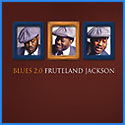

FRUTELAND
JACKSON
Blues 2.0
The title of Fruteland Jackson's latest release — one of the finest blues albums of this young decade — does not refer to the fact that it's his second effort for Electro-Fi Records. Rather, Jackson's announcing his intention to update the language of blues. Like software, this music can indeed be made more accessible with an upgrade, but there's always risk of creating something incompatible with tradition. The main difference between Jackson and a thousand lesser lights is that he's changing the content, not the form, which is why the most relevant blues album of 2003 happens to be built around musical styles that went out of favor when they dismantled the WPA. When this man declares "I Can Still Rock and Roll," he's not talking about music.
Jackson's secret weapon is his song-writing; his mastery of prewar idioms is frightening in its totality. (The vocalist/ guitarist also has created an award-winning curriculum for teaching blues in American schools.) He's well versed in Piedmont, Delta, field hollers, country blues, and more, and it lends his crusade an air of authenticity. Even artists who understand and can write ragtime, for example, are seldom able to craft complex bridges such as the one in "Moon Man Rag"; fewer still would think to downshift from acoustic boogie to a sultry half-time strut and back again in the seductive "Laura Marie."
Throughout Blues 2.0, Jackson's commitment engenders pure beauty, resulting in transcendent mo-ments such as "How Could We Live Without Love," an acoustic meditation laced with torchy jazz trumpet. These are not museum pieces. The lyrics are where Jackson most fully modernizes his approach. The afore-mentioned "Love" mines philosophical depths most modern roots artists can't with its elemental, almost haiku-like verses, while "Sometimes Bad Man Blues" manages to evoke sympathy for the hard work liars and scoundrels have to do to keep up their fronts.
Even when the mood gets lighter, his observations remain on the mark. In "Moon Man Rag," he delivers a number of sly puns on the terminology of menstruation, then sums it all up: "I don't understand, I'm still in the dark/Maybe they should call it a question mark." He mentions Viagra in "My Pencil Don't Write No More" and, on the title track, declares he's "traded in my hammer for a hundred e-mails." From another artist, it might seem like pandering, but the musi-cal and emotional authenticity of the performances carry the ring of absolute truth, something essential to making this music relevant to non-fans.
Learning to play blues is easy, considering the thousands of people who (barely) make a living at it. But speaking the language like a native is something else entirely, and Fruteland Jackson, thank God, knows how to do both — and how to translate for the rest of us.
– Robert Fontenot
[ Home | News | CDs | T Shirts | Artists' Bios | Order | Links]